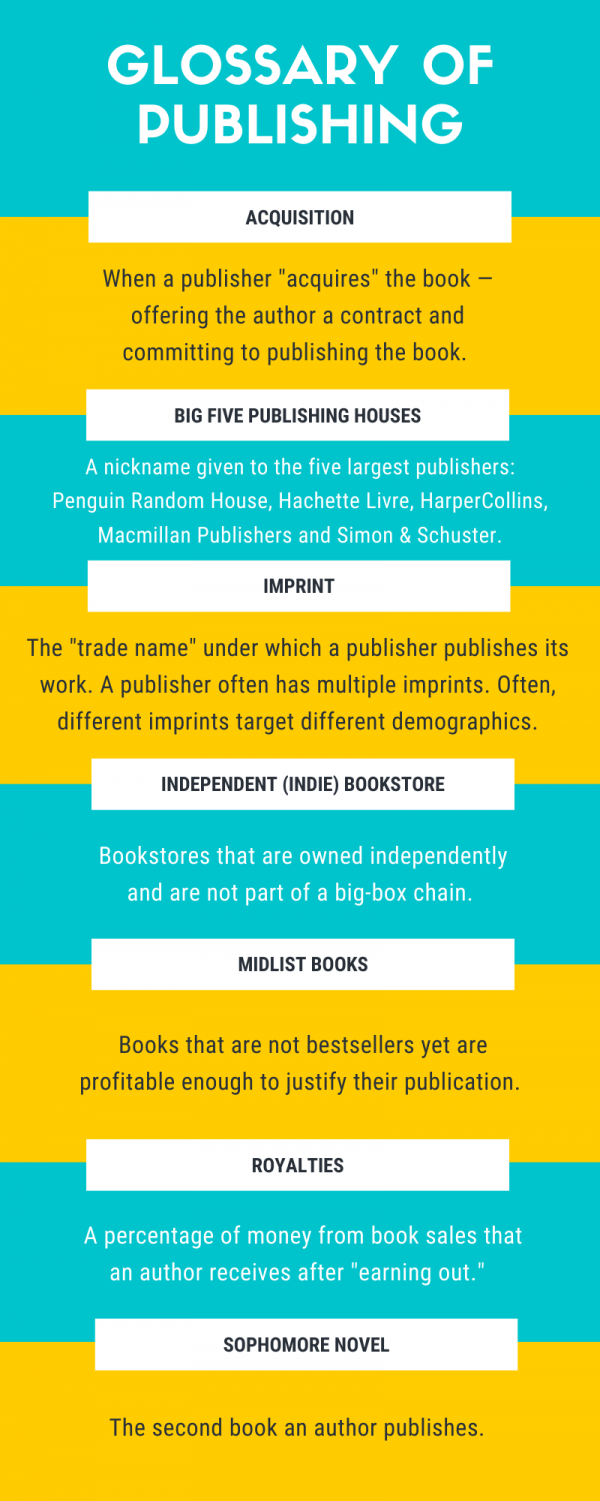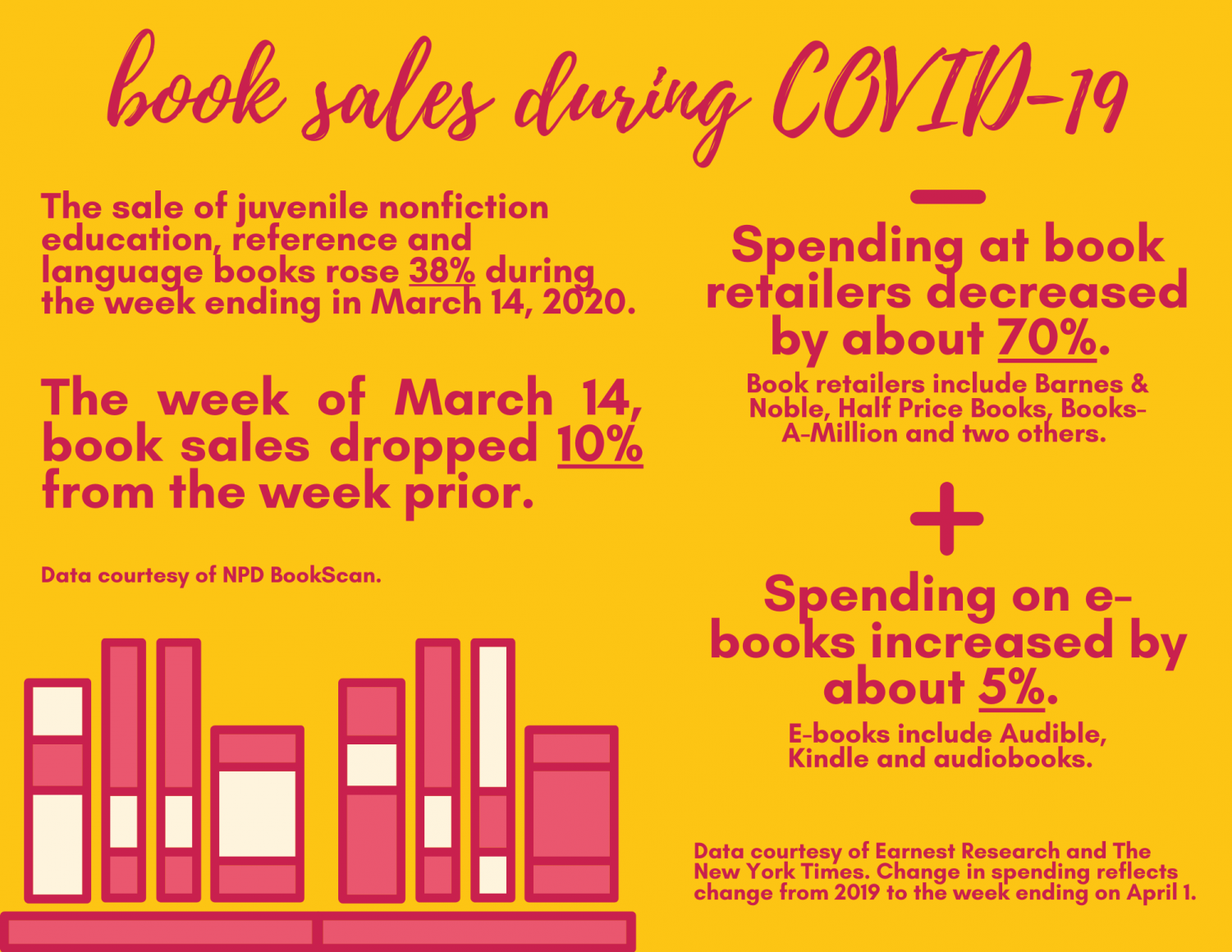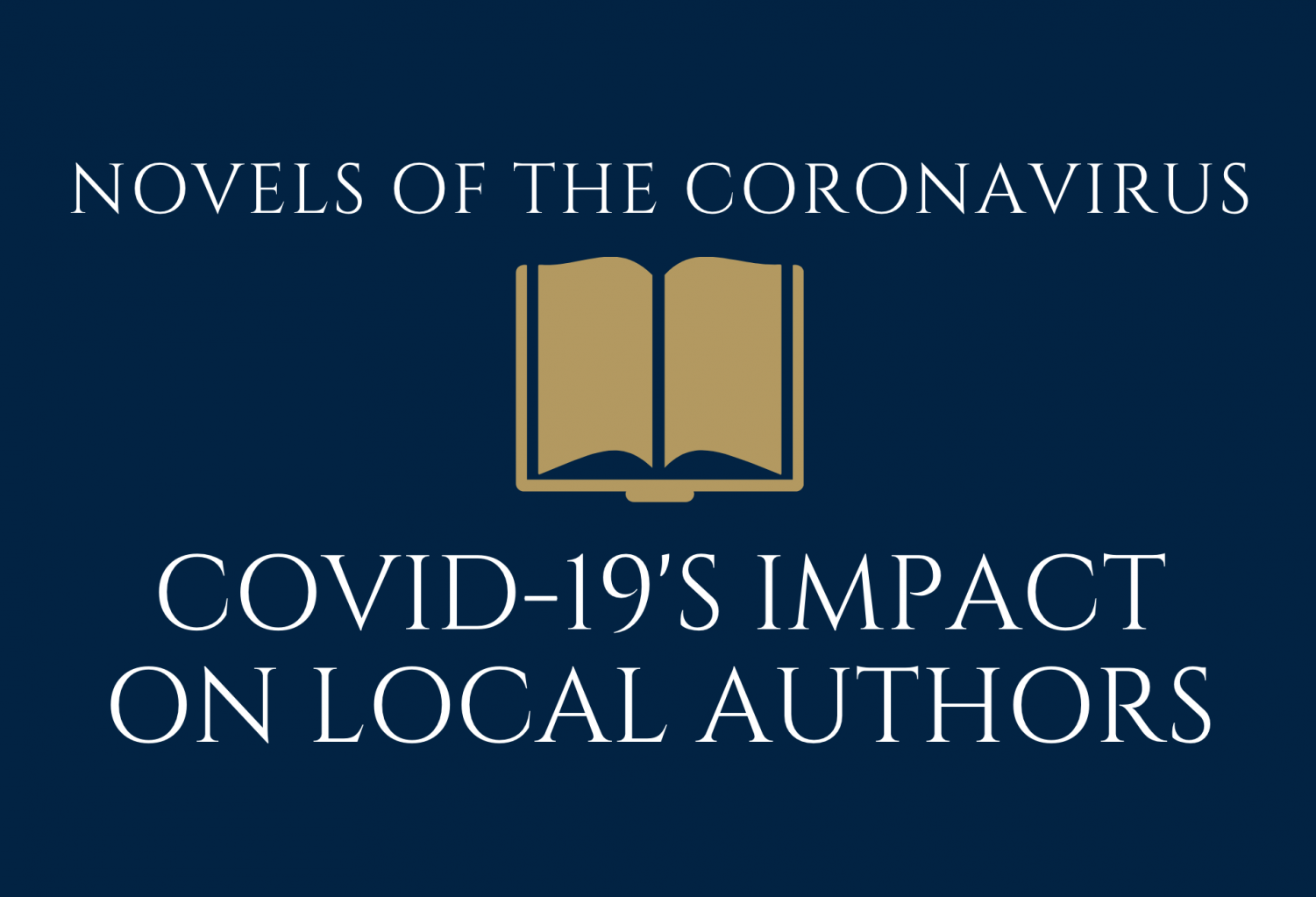Novels of the Coronavirus: Part 1
April 16, 2020
“It’s a nightmare,” said Addie Thorley, a young adult author from Princeton, New Jersey.
With COVID-19 shutting down “nonessential” businesses and disrupting daily life all around the world, many industries have been faced with unforeseen problems and possible long-term fallout. Publishing is one of those industries.
Thorley continued: “It’s kind of a breakdown of the entire [publishing] process.”
Thorley is not exaggerating: Publishing houses, such as Macmillian, have furloughed and laid off employees; Barnes & Noble has temporarily closed more than 500 stores; even Amazon has deprioritized books and delayed shipping in favor of “household staples, medical supplies, and other high demand products.”
Thorley’s second novel, “Night Spinner,” came out in mid-February. She had a launch party for the book and was able to attend some events, one in Florida and a couple local, before self-isolating. However, Thorley’s recent book was already in a relatively risky position: in publishing, even COVID-19 notwithstanding, nothing is set in stone.
“You just don’t know: you don’t know what people are going to like, it’s all such a gamble,” said Thorley. “So to throw[ing] in a pandemic on top of it is just the icing on the cake.”
You just don’t know: you don’t know what people are going to like, it’s all such a gamble… so to throw[ing] in a pandemic on top of it is just the icing on the cake.
— Addie Thorley
Publishing nowadays prioritizes debuts (the first novel an author publishes): if one scrolls around the book-ish side of Twitter for long enough, they are bound to find screenshots and excited tweets about one 20-something or another selling their first book. That culture of idolizing debuts causes less of a spotlight to shine on following novels.
“Everyone is obsessed with debuts,” said Thorley. “And that is another reason that I was already nervous about “Night Spinner’s sales, because it’s a sophomore novel. And so it gets less attention to begin with. And then to not have it in the bookstores has definitely been weighing on my mind.”
With bookstores closed or only open with skeleton crews, along with the generalized panic of COVID-19, the number of people buying books has decreased. Earnest Research reported that spending at book retailers decreased about 70% from 2019 to the week ending on April 1. Because of the unsettling financial aspect that a book coming out during COVID-19 poses, several imprints are pushing their spring 2020 releases to summer or fall.

A glossary of terms for understanding publishing.
“I don’t know if it was good that [“Night Spinner”] came out in early February so I had a little bit of time before the crap hit the fan, or if it would have been better had it been later so it could have been pushed,” said Thorley. “Even though I don’t know if my imprint is pushing — I don’t know that any of our spring titles are being pushed. And [coming out now] would definitely be worse.”
Bookstore closures have another impact on sales — some bookstores buy on consignment, meaning they can send back books they no longer want or that did not sell. Thorley noted that of the first six to seven weeks of “Night Spinner” being out, she had already had 450 returns compared to the one or two returns of her debut novel, “An Affair of Poisons,” in that timeframe. This will undoubtedly affect how long it will take Thorley to earn out on Night Spinner. (Advances, which authors get paid when they grant the publisher the right to publish their book, are technically called “advances against royalties.” Once a book “earns out,” recouping the cost of the advance, the author begins making royalties off any further sales.) Recently, Thorley’s publisher discounted her debut’s e-book, which resulted in an increase in sales: however, that discount resulted in decreased royalties from those copies.
But what does it matter if a single book underperforms?
For many authors, future book deals are highly dependent on past performance. The implications of COVID-19 causing sales to dip are worrying.
“A lot of people are worried about sales numbers from right now… affecting our ability to get future book deals down the road. Because that is something that they look at heavily, when you’re on submission, and if you have terrible sales numbers, we’re all just hoping that the circumstances will be taken into consideration. So, if your sales aren’t as good as they were projected to be, [we hope] they won’t put all of that on us,” said Thorley. “I mean, that’s probably wishful thinking.”
Luckily for Thorley, she has already received her advance for the second book in the Night Spinner duology. Unluckily, if her current book does not perform as well as the projections expect, that could impact both the readership of the duology along with future book deals.
“Generally speaking with series, unfortunately, you see fewer sales with each book,” said Thorley. “Unless it’s something that breaks out in a big way, like “The Hunger Games.” So you’re already going to see a drop off. And then, if people can’t get the first book in the series, the second book in the series is not positioned well, out of the gate.”
On the other side of the coin is Tiffany Schmidt, a young adult author who lives in Doylestown, Pennsylvania. She faces a different dilemma: the third book in her “Bookish Boyfriends” quartet is slated for mid-May.
This poses a host of potential problems: with physical bookstores closed and books deprioritized on Amazon (at one point, the pre-order button was removed for around two days), moving books is going to be difficult.
“Am I scared about my May release?” said Schmidt. “Very much. Because nobody’s walking into a bookstore, seeing the cover, picking it up and saying ‘oh, this sounds good.’”
Per Schmidt, one of the major ways people find their books is through bookseller recommendations or simply seeing the book on shelves and taking a closer look. Especially at independent bookstores.
“[Independent booksellers] are the people who, if a parent comes in and says ‘I have an eighth grade/ninth grade reader and am looking for a book like this or that,’ will pick up and hand sell one of my books — or hand sell so many other people’s books. Books that aren’t just the New York Times Best Sellers. And we need them. We need those people who know a huge breadth and depth of books, so we’re not all seeing the same twenty titles all the time,” said Schmidt. “But those moments that books live and die on are bookseller recommendations, having it on a table, having someone pick it up, and those can’t happen if there are no places for that to happen.”
But those moments that books live and die on are bookseller recommendations, having it on a table, having someone pick it up, and those can’t happen if there are no places for that to happen.
— Tiffany Schmidt
Thus, a reader’s exposure to books further suffers when people who recommend books are no longer able to access said book ahead of publication. Advanced reader copies, or ARCs, are a pivotal part of building momentum for new releases. Ever wondered how books already have reviews on Goodreads the day they come out? Or why newspapers and magazines can talk about unreleased books? That is the work of ARCs.
“What’s working now for publicity, when you can’t go anywhere, when you can’t mail ARCs?” asked Schmidt. “You can’t do that because nobody is in the publisher’s office to get those ARCs.”
While it is possible to send out digital ARCs, that makes the copies much more susceptible to piracy. Additionally, book events and conventions, another important part of the publishing process, have been put on hold too. While the importance of events diminishes the more popular an author is (J.K. Rowling or Stephen King could create bestsellers without leaving their house), they still hold an important place in the industry.

An infographic on the statistics of book sales during the pandemic.
“For some major authors, their books are gonna sell regardless. For smaller and midlist authors, [events] can put you on a lot of radars of people who wouldn’t have heard of you otherwise,” said Schmidt. “And it’s that networking piece that’s so important.”
Similar to Thorley, Schmidt’s series is not in jeopardy due to COVID-19. However, there have been cases in publishing when series have been cancelled due to low sales. New York Times Bestselling Author Maggie Steivater, author of “The Raven Cycle” series, has been vocal about how a downturn in sales (in her case, due to piracy) almost led to “The Raven Cycle”’s sister-series being cancelled before it began.
“All of publishing is going through this. We’re all kind of navigating it together,” said Schmidt. “… I think I’m in a very good position — the fourth book in the series, which is the last book for now, is supposed to come out in January. It’s already written, they’re working on the cover, all of it is done, edited, complete. So, I mean, maybe it ends up being bumped a season, because a lot of books have been bumped from spring to fall, and it’s possible they could say, ‘okay, our fall is now too full, we’re gonna push this forward.’ It’s possible sales will be impacted because people never heard about book three so they’re not buying book four.”
Just like the rest of the economy, COVID-19 is going to have some long-term effects on publishing. COVID-19 has already disrupted schedules in big ways and small: finding time to write is now harder for Thorley, as her toddler no longer has daycare, and many imprints are pushing publication dates later into the year.
“I am luckily in a position where this is not going to affect the outcome of the [“Bookish Boyfriends”] series and I would be hopeful that publishing is not holding this against any of their authors,” said Schmidt. “That being said, publishing is taking a financial hit just like any other industry right now. So I don’t know what that’s going to mean for the future of publishing — if that means there are going to be consolidations. We’ve already seen some layoffs at Macmillan [one of the big five publishing houses], I don’t know if we will start seeing more of those, I don’t know if lists will be shrunk or if it’ll just be that authors get paid less, smaller advances or what that’ll look like.”
As soon as you do read something, put your review on Amazon and Barnes & Noble and Goodreads and help the author get the word out there.
— Addie Thorley
Though the immediate and long term future of publishing looks bleak, there are some things that readers can do to help their favorite authors.
“I think one of the biggest things is pre-ordering books. So even if it does get pushed, preorders signal to publishers how well a book is gonna do. So just preordering as much as you can, boosting online… and honestly just reviews,” said Thorley. “So if you happen to get an ARC of something, review it. Or as soon as you do read something, put your review on Amazon and Barnes & Noble and Goodreads and help the author get the word out there.”
Of course, there will still be a ripple effect. Due to the furloughs and layoffs to publishing staff and editors, some of whom may not be rehired, the number of people acquiring books could decrease. They might not buy things that they are not sure will sell — causing a lull in publishing. That would mean fewer sophomore books, fewer series and, yes, fewer debuts.
“Best possible case scenario, I guess [is] publishing recovering fairly quickly and everyone furloughed be brought back on,” said Thorley. “I think the best thing we can hope for is that we don’t have too big of a breakdown. Once the world is back up and running, if we can get back up and running fairly quickly, I think that’s the best that any of us can hope for.”
But in the immediate future, there may be a more pressing concern: lots of publication printing happens in China.
“Is publication actually going to be delayed of some books because we can’t get the books in and out of the country?” asked Schmidt. “I don’t know the answers to those questions.”
There was already a paper shortage in 2019 that affected the book and magazine industries. But this could pose a more massive upheaval.
“There’s a paper shortage, there already was, and this has made it ten times worse. Because I know the plant where a lot of paper was sourced in China has been shut down — hopefully that’s coming back soon,” said Thorley. “Even the book binderies, where they put the books together, are not an essential business, so those are closed and you can’t get books printed.”
And then, there’s the question of distribution — if a distributor can ship books but there is nobody at bookstores to receive them, are those books distributed?
“It’s kind of a breakdown of the entire process and it’s definitely going to be a ripple effect. I think it’ll be a while before publishing recovers. And it may never be quite what it was before. I don’t even know — I don’t know what to expect,” said Thorley. “I think a lot of people don’t realize everything that goes into publishing and that we’re impacted by this too. Because, ‘oh, you can just stay home and read’ — well, not if they can’t print the books.”
Novels of the Coronavirus is an ongoing series covering the effect of COVID-19 on local authors, booksellers and publishers.

